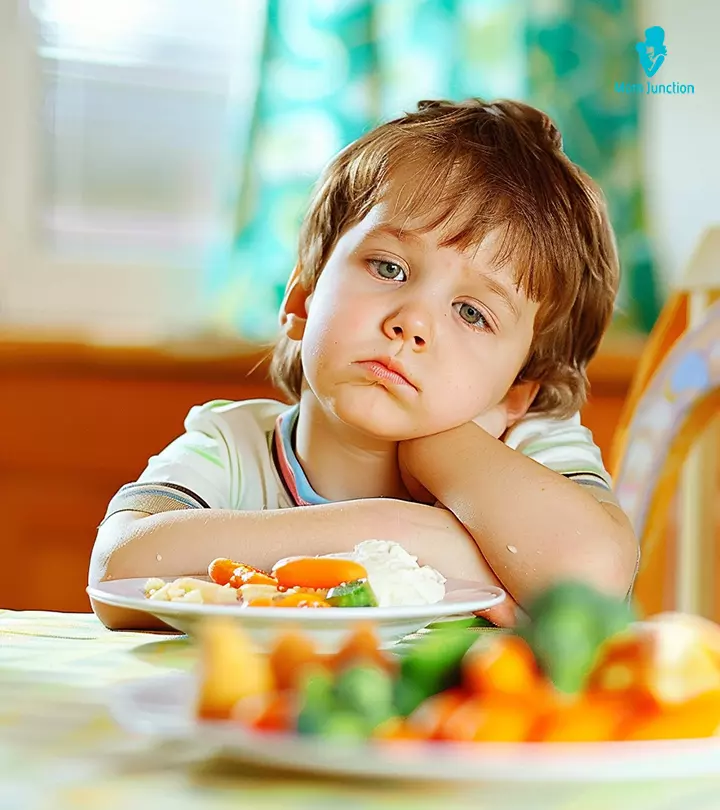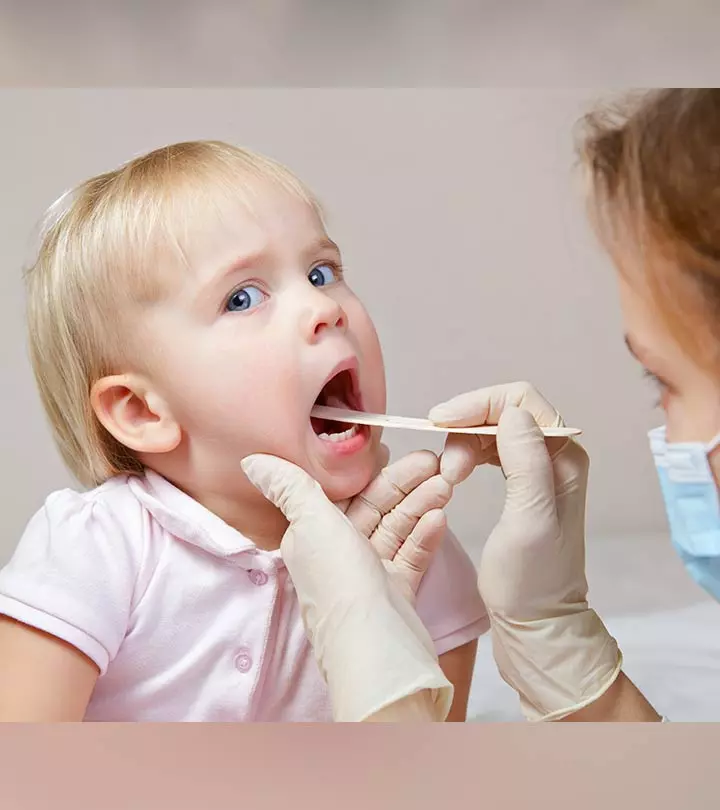
Image: Midjourney/ MomJunction Design Team
A loss of appetite in children might cause worry in most parents. However, it is quite common in children between one and five years old (1). Nevertheless, in some rare cases, a loss of appetite may signal underlying health issues or growth phases. It’s important to consult a doctor if you notice your child losing their appetite too often. Understanding the typical and atypical causes of appetite loss can ease your worries and give you better insights into your child’s eating habits. Read on as we tell you the possible reasons your child may be losing their appetite and give you tips on preventing it. We also give you tips on helping your children build their appetite again.

Key Pointers
- Loss of appetite is typical among toddlers aged 2-5, but frequent instances should prompt medical consultation.
- The condition can be caused by slow growth rate, stress, certain medications, and other underlying medical conditions.
- If the child is developing normally, a reduced food intake is usually not a cause for concern.
- To address this issue, parents can present children with a diverse selection of healthful food choices, adjust their meal schedules, and encourage physical activity.
When Should You Worry?
If your child has normal weight and height (for their age), then there might not be a reason to worry, as some children with a slight build might have lesser food requirements and, therefore, a lesser appetite (2). Also, it’s usually nothing to worry about if your child eats less than usual but stays energetic and maintains a healthy weight, skips a meal after a large snack, eats less during hot weather, or temporarily prefers one food group before naturally shifting to others.
However, if your older child experiences sudden loss of appetite for more than a week and starts losing weight, you may consult a pediatrician to identify the cause and correct it.
General consultant and gastroenterologist Dr. M Madhan Kumar says, “A child who consistently loses their appetite is at risk of malnutrition, slow growth, weakened immunity, and delayed development. A lack of adequate proteins, iron, calcium, and vitamins can impact the body, leading to difficulties with thinking, drowsiness, stunted bone growth, fatigue, and more. Therefore, persistent loss of appetite should be evaluated by a doctor.”
Additionally, if your child complains of stomach pain and refuses to eat for several days, consistently eats very little while showing signs of fatigue, irritability, and poor concentration, or experiences any sudden change in appetite accompanied by fever, vomiting, or diarrhea, it’s vital to seek medical attention (3).
 Point to consider
Point to considerPossible Reasons For Loss Of Appetite In Children
If your child is always tired and irritable, it might be linked to a lack of appetite and adequate nutrition. Here are a few possible reasons why children might lose their appetite:
1. Slow growth rate
Changes in growth and development can cause an appetite slump in children. During the first year, children grow rapidly. But after that, the growth slows down, and they may eat less food. During this period, a decline in appetite is perfectly normal. In fact, in the second year of life, children only need to put on 2.3kg and 12 cm as opposed to 7 kg and 21 cm in the first year (2).
2. Sickness

Children may experience a significant loss of appetite due to allergies, chronic illnesses, or infections. Hence, weight loss in kids during these times is generally normal. If your child has symptoms such as a sore throat, stomach flu, diarrhea, headache, or fever, they might eat less than usual (4). Fortunately, most children will regain their appetite as they recover. Once they begin eating the usual amounts of food, it is highly likely that they will also regain their lost weight.
3. Stress
Stress can have many negative effects, including loss of appetite, on young children (5). If you find that your child is losing interest in eating or having a hard time sleeping, then they may be suffering from stress. To address your child’s poor appetite, you need to identify the cause of stress and alleviate it. Some common causes of stress during childhood are (6):
- Family issues such as the death of a family member, loss of a pet, birth of a sibling, or changes in family dynamics
- Bullying
- Inability to cope with academic pressure and the impractical expectations of parents
4. Depression
Depression could be another reason for a child’s loss of appetite (7). Most parents mistake depression for sadness. But sadness and depression are not the same. Feelings of sadness go away with time, but depression does not. Depression not only makes the child sad but also interferes with their normal life.
According to the US Centers for Disease Control and Prevention (US CDC), depression is one of the most commonly diagnosed mental health issues in children. From 2025 to 2025, the prevalence of diagnosed depression among US children between 3 and 17 years was 4% (8).
If your child shows a significant lack of interest in activities that they previously enjoyed, then they may be depressed. A change in eating habits could be a strong indicator of depression. It is advisable to seek medical advice if you are concerned about your child’s mental health (9).
5. Anorexia nervosa
Sometimes, in a bid to emulate/ copy their screen idols and for several other reasons, children develop a psychological aversion to eating. They reduce their dietary intake or avoid eating for as long as possible. Even when they eat, they develop food preferences or become picky eaters, choose low-fat foods, and later feel guilty about eating them. Genetics, brain chemical imbalances, and developmental issues can also cause anorexiaiAn eating disorder and mental health condition characterized by abnormally low weight and fear of weight gain nervosa (10).
A Canadian Paediatric Society, Nutrition and Gastroenterology Committee report states, “When a decrease in appetite is a manifestation of an organic disease, it often appears abruptly and relates to all types of food. A complete functional inquiry is important to rule out the possibility of the many acute or chronic illnesses that are associated with anorexia (2).”
If your child is avoiding food or exercising more than they should, while losing weight drastically, they may be suffering from anorexia nervosa. An eating disorder specialist can tell you how to help your anorexic child regain a healthy appetite (11).
 Quick tip
Quick tip6. Medications

If the child has been on a recent course of antibiotics, their appetite may be affected due to the potential medication side effects (3). Several other medications could also affect appetite (12).
7. Anemia
Anemia is another possible cause of a decline in a child’s appetite (13). Children with anemia seem lethargic, tired, and irritable. If left untreated, anemia can interfere with your child’s development and school performance (14). Get a blood test done if you suspect anemia in your child.
8. Intestinal worms
Intestinal worms in children can cause loss of appetite (15). Worms enter into a child’s digestive system and live there as parasites, causing intestinal bleeding, loss of appetite, dysenteryiAn intestinal infection that results in bloody or mucousy diarrhea , etc. DewormingiGetting rid of the parasitic worms from the body using an anthelmintic drug. medicine can be obtained through your pharmacist or doctor. If you have pets, deworm them twice a year and deworm your children after the age of two at least once a year or as advised by your pediatrician (16).
9. Constipation

Irregular bowel movements in children can lead to constipation. A loss of appetite in children could cause constipation. A sign of constipation is hard stools (17).
In addition to the above causes, the loss of appetite in children could be due to other reasons, such as authoritative parenting, how much food the mother offers, family meals, socioeconomic status, and fear of trying new foods (18).
How To Improve Your Child’s Appetite
Here are some natural ways to increase your child’s appetite. We have also listed a few supplements that you can use (19) (20).
- Children like to snack. But these snacks should be as good as meals. Make smart and nutrient-rich food choices. For instance, give the child roasted peanuts instead of crisps, sandwiches, baked veggies, fruit, and nut bars instead of cookies.
- Do not allow them to snack when it is time for meals; maintain a consistent time gap between both.
- Peanuts might help in appetite-boosting and protein-building, hence consider adding more peanut-based foods to your child’s diet.
- If your child refuses to drink milk, add calcium to their diet in the form of cottage cheese, yogurt, cream, and curd. You could also use non-dairy milk if they prefer that.

- If your child has a reduced appetite, offer smaller bites of food until they start eating properly on their own. Smaller quantities might help in increasing metabolism and in turn, increase the appetite.
- Make an inventory of the nutritious foods your child likes to eat and tailor the meals to suit their tastes. When your child sees their favorite food on the plate, they are more likely to eat.
- Choose healthy, calorie-dense foods to increase weight.
- Some herbs and seasonings such as ginger, cayenneiModerately hot chili pepper , and ginger might work as appetite stimulants (21). You may sauté herbs and spices in olive oil before mixing them to a meal for added flavor.
- It is believed that lemon juice, ginger, and vinegar might stimulate gastric secretions and one’s appetite (22).
- Mix greens and several other veggies to bring about a variety of colors into your child’s meal.

- Make them a smoothie with strawberries, honey, bananas, ice, and Greek yogurt to make food interesting.
- Try to introduce new foods and flavors slowly so that your child would be accustomed to their tastes.
 Did You Know?
Did You Know?If your child’s appetite is not back to normal, even after trying these measures, then it is best to take them to a pediatrician as there could be an underlying medical condition. Also, never punish or scold your child for not eating enough. Instead, observe their eating patterns and try to find out the cause for the decreased appetite.
Also, sometimes the child might be eating right for their age and exceeding parental expectations might cause worry in parents. So, evaluate your doubts with your child’s doctor.
With a few simple tips, you might be able to prevent the loss of appetite in children (only when there is no underlying medical condition).
Tips To Prevent Loss Of Appetite In Children
Here are some tips that might help in preventing a loss of appetite and nutritional deficiencies in children (23):
- Make the meals look interesting and a visual treat for your children.
- Do not argue with or scold the children during mealtime.
- Adjust the meal schedules so that you serve food only when your child is hungry.
- Encourage your child to make healthy food choices.
- Involve your child in meal planning and preparation.
- Serve small portions at regular intervals.
- Encourage your child to be physically active.
- Avoid forcing your child to eat if they’re not hungry, and don’t insist that they finish everything on their plate.
Frequently Asked Questions
1. Is it normal for kids to lose their appetite?
Sometimes it is normal for children to lose their appetite without specific reasons. Not eating enough, not being hungry, or only eating if spoon-fed are common concerns of parents and caregivers related to a child’s appetite. However, there is no need for concern about appetite if your child has required energy levels and is growing at an average pace and meeting growth curves for their age (1).
2. When does a child’s appetite decrease in childhood?
Children’s appetite seems to slow down between ages one to five, and it’s normal. There won’t be rapid weight gain and growth in toddlers and preschoolers. Children only gain four to five pounds a year from age one to five. Parents can be worried since they may not notice significant weight gain as in infants that is an average of 15 pounds in a year.
When children may go without significant weight gain for three to four months, they may need fewer calories and have a poor appetite. This is called physiologicaliPertaining to how bodies of living things work anorexia, and there is nothing to worry about. However, seek a pediatrician’s advice to ensure that your child is not experiencing malnutrition or undernutrition, or any other underlying conditions (1).
3. What do I feed a child with no appetite?
Let children eat the amount of food that they need. Do not restrict or force them to eat. Unless a pediatrician prescribes it for medical reasons, there is no need to feed nutritional supplements or medications to enhance appetite in children. You may set a regular snack and mealtime routine to offer them healthy balanced meals. Encourage physical activities to increase appetite and avoid distractions during meals (24).
4. Can dehydration cause loss of appetite?
Loss of appetite may be a symptom of dehydration. Other symptoms include concentrated and dark-colored urine, headache, tiredness, confusion, light-headedness, dry mouth, muscle cramps, and constipation (25).
5. How to feed a picky eater?
If your child is a picky eater, choose foods that match their age and taste preferences. Serve small portions of various foods, and keep a proper gap between meals and snacks. Model healthy eating, minimize distractions, involve the family, and make mealtimes enjoyable (2). Be patient and allow ample time for your child to explore and accept new foods.
Stress, anemiaiA health condition when your body doesn't produce enough healthy red blood cells to supply your tissues with enough oxygen. , intestinal worms, or medical conditions such as anorexia nervosa could be causes of loss of appetite in children. They can negatively impact a child’s long-term development and growth. So, if your child seems to be eating less than usual, observe their eating habits and check their height and weight to see if they are within the typical range. Since children may lose their appetites for no apparent reasons, there is no need to be concerned if your child is healthy, happy, and sleeps well. However, a persistent loss of appetite necessitates medical treatment.
Infographic: How To Improve Your Child’s Appetite
Children need to eat well not only for strong physical growth but also for good brain health for them to be able to concentrate on their studies. But if you struggle to get them to finish their meals, this infographic can help. Incorporate these tips and lifestyle changes to make your children eat well. Illustration: Momjunction Design Team
Illustration: Loss Of Appetite In Children: 9 Causes And 7 Prevention Tips

Image: Stable Diffusion/MomJunction Design Team
Learn how to recognize and manage a child’s loss of appetite. Understand how to nurture healthy eating habits in children and encourage them to consume nutritious meals.
References
- Why Is My Child Suddenly Not Eating?
https://healthcare.utah.edu/the-scope/kids-zone/all/2025/11/why-my-child-suddenly-not-eating - Alexander KC Leung et al; (2012); The ‘picky eater’: The toddler or preschooler who does not eat.
https://pmc.ncbi.nlm.nih.gov/articles/PMC3474391/ - Poor Appetite in Children – Causes and Tips to Improve.
https://www.narayanahealth.org/blog/poor-appetite-in-children-causes-and-tips-to-improve - Luay Al-Nouri and Khalid Basheer; (2005); Mothers’ Perceptions of Fever in Children.
https://academic.oup.com/tropej/article/52/2/113/1652063 - Stress in childhood.
https://medlineplus.gov/ency/article/002059.htm - How to help children and teens manage their stress.
https://www.apa.org/topics/children/stress - W Kyle Simmons et al; (2017); Depression-related increases and decreases in appetite reveal dissociable patterns of aberrant activity in reward and interoceptive neurocircuitry.
https://pmc.ncbi.nlm.nih.gov/articles/PMC4818200/ - Data and Statistics on Children’s Mental Health.
https://www.cdc.gov/children-mental-health/data-research/?CDC_AAref_Val=https://www.cdc.gov/childrensmentalhealth/data.html - Joan L Luby; (2011); Early Childhood Depression.
https://pmc.ncbi.nlm.nih.gov/articles/PMC3184299/ - What Is Anorexia?
https://www.nationwidechildrens.org/conditions/anorexia-nervosa - Anorexia Nervosa in Children.
https://www.hopkinsmedicine.org/health/conditions-and-diseases/eating-disorders/anorexia-nervosa-in-children - Side effects.
https://www.nhs.uk/conditions/antibiotics/side-effects/ - Hanin Ghrayeb et.al; (2025); Appetite and ghrelin levels in iron deficiency anemia and the effect of parenteral iron therapy: A longitudinal study.
https://pmc.ncbi.nlm.nih.gov/articles/PMC7272047/ - Nancy C Andrews; (2015); Hungry irony.
https://pmc.ncbi.nlm.nih.gov/articles/PMC4588277/ - Worms.
https://www.rch.org.au/kidsinfo/fact_sheets/Worms/ - Adam Easton; (1999); Intestinal worms impair child health in the Philippines.
https://pmc.ncbi.nlm.nih.gov/articles/PMC1114714/ - Constipation.
https://www.nhs.uk/conditions/constipation/ - Silvia Scaglioni et.al; (2018); Factors Influencing Children’s Eating Behaviours.
https://pmc.ncbi.nlm.nih.gov/articles/PMC6024598/ - Your Child’s Appetite Has Changed: When to Worry.
https://www.rileychildrens.org/connections/your-childs-appetite-has-changed-when-to-worry - Poor Appetite.
https://www.holtinternational.org/poor-appetite/ - Ginger: An Overview.
https://www.aafp.org/pubs/afp/issues/2007/0601/p1689.html - Optimizing Gastric Motility.
https://traditionalroots.org/wp-content/uploads/2017/04/Stansbury-Optimizing-Gastric-Motility-NOTES.pdf - When Your Toddler Doesn’t Want to Eat.
https://familydoctor.org/when-your-toddler-doesnt-want-to-eat/ - My Toddler’s Appetite Has Decreased. What Should I Do?
https://www.unlockfood.ca/en/Articles/Childrens-Nutrition/Picky-Eating/My-toddler%E2%80%99s-appetite-has-decreased-What-should-I.aspx - Dehydration.
https://my.clevelandclinic.org/health/diseases/9013-dehydration
Community Experiences
Join the conversation and become a part of our nurturing community! Share your stories, experiences, and insights to connect with fellow parents.
Read full bio of Jenni Johnson
- Dr. Madhan Kumar Madathupalayam Velusamy is a surgical gastroenterologist with over 23 years of experience. He graduated from Coimbatore Medical College and completed his post-graduate studies at Sri Ramachandra Medical College and Research Institute, Chennai. Dr. Velusamy received his DNB in surgical gastroenterology from Gem Hospital, Coimbatore, and is a visiting surgeon and faculty member at various hospitals in Western Tamil Nadu.
 Dr. Madhan Kumar Madathupalayam Velusamy is a surgical gastroenterologist with over 23 years of experience. He graduated from Coimbatore Medical College and completed his post-graduate studies at Sri Ramachandra Medical College and Research Institute, Chennai. Dr. Velusamy received his DNB in surgical gastroenterology from Gem Hospital, Coimbatore, and is a visiting surgeon and faculty member at various hospitals in Western Tamil Nadu.
Dr. Madhan Kumar Madathupalayam Velusamy is a surgical gastroenterologist with over 23 years of experience. He graduated from Coimbatore Medical College and completed his post-graduate studies at Sri Ramachandra Medical College and Research Institute, Chennai. Dr. Velusamy received his DNB in surgical gastroenterology from Gem Hospital, Coimbatore, and is a visiting surgeon and faculty member at various hospitals in Western Tamil Nadu.
Read full bio of Swati Patwal
Read full bio of Rohit Garoo
Read full bio of Dr. Joyani Das

















